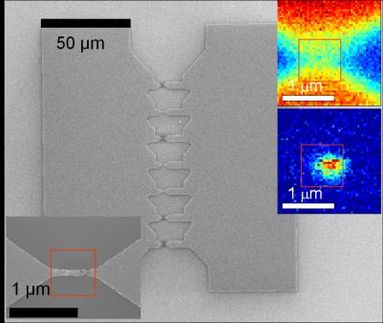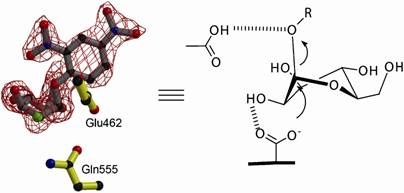Licence to go where no chemist has gone before
Scientists at The University of Nottingham have overcome one of the significant research challenges facing electrochemists. For the first time they have found a way of probing right into the heart of an electrochemical reaction.
Their breakthrough will help scientists understand how catalysts work. If this is understood even better catalysts could be created.
Chemists and engineers, under the direction of Dr Pete Licence in the School of Chemistry, overcame significant challenges to be able to study the reaction at the point where the solution touches the surface of the metal electrode bringing in the electricity. They have done this by using spectroscopy under ultra high vacuum.
The research has been hailed as a major breakthrough by electrochemists and an important step forward in the development of new catalysts and sensors. The results will be published in the Royal Society of Chemistry (RSC) journal Chemical Communications and the article has also been featured in Highlights in Chemical Science which showcases news from across RSC publishing.
Because catalysts — materials used to create a chemical reaction — are dissolved in a solution it is often very hard to understand why they work so well. Normally solutions evaporate almost instantaneously under high vacuum. The team overcame this obstacle by using one of the many room temperature ionic liquids (RTILs) — so-called 'designer solvents' which do not evaporate under such conditions.
Dr Licence said: "It wasn't easy and we had phenomenal problems. We could do the electrochemistry in the vacuum and we could measure the spectra of ionic liquids — but to do both at the same time has been a real uphill struggle — but now we have cracked it."
With funding from the Engineering and Physical Sciences Research Council (EPSRC) and the Leverhulme Trust, Dr Licence and his team have successfully managed to integrate electrochemistry with UHV spectroscopy to allow the in-situ characterisation of interesting metal based compounds whilst in solution. They believe that their technique will allow them to shed light on the design of new catalysts for energy generation and efficient chemical production using ionic liquid based approaches.
Dr Licence's research, in the Nottingham Ionic Liquids Group, focuses on both the exploitation and manipulation of some of the unusual physical properties that are offered by alternative solvent systems, especially room temperature ionic liquids. His group is part of the University's DICE project, which brings chemists and engineers together to solve challenging scientific problems.
Dr Licence said: "The implementation of green chemistry and sustainability are key concepts that run throughout both my research and teaching interests. The development of environmentally benign materials and products via efficient, clean chemistry is my long-term goal. As a result of this research we can design more efficient catalysts, new probes, sensors, functionalised electrodes. We really want to push this technology to see how far we can take it."
See the theme worlds for related content
Topic World Spectroscopy
Investigation with spectroscopy gives us unique insights into the composition and structure of materials. From UV-Vis spectroscopy to infrared and Raman spectroscopy to fluorescence and atomic absorption spectroscopy, spectroscopy offers us a wide range of analytical techniques to precisely characterize substances. Immerse yourself in the fascinating world of spectroscopy!

Topic World Spectroscopy
Investigation with spectroscopy gives us unique insights into the composition and structure of materials. From UV-Vis spectroscopy to infrared and Raman spectroscopy to fluorescence and atomic absorption spectroscopy, spectroscopy offers us a wide range of analytical techniques to precisely characterize substances. Immerse yourself in the fascinating world of spectroscopy!



























































